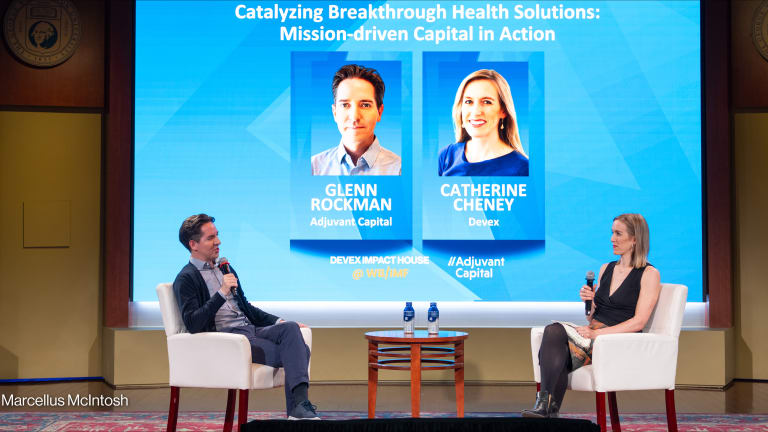
SAN FRANCISCO — While conversations on connecting the unconnected often target technology solutions, the focus at this year’s Social Capital Markets conference was on capital for connectivity, or ways to finance efforts to bring the rest of the world online.
Only 1 in 3 people in the developing world are connected to the internet, and even those who are tend to experience poor connectivity quality. A session at SOCAP called “Investing in the building blocks for digital inclusion” explored the social and financial returns of internet access across a range of sectors, including education, health, and agriculture. Panelists sought to make the case to investors in the room that connectivity should be considered an investment sector.
“We’ve seen the role digital solutions can play in accelerating the achievement of social impact and international development outcomes and improving efficiency in a lot of the service delivery we’re all working on,” said John Garrity, a policy adviser for digital inclusion who most recently worked with the United States Agency for International Development.
Jim Forster, managing director at INI Holdings, an investment company that is using venture capital to try and close the digital divide, said internet service providers, or ISPs, play a critical role along with mobile network operators, or MNOs. There is a wider range of investment angles with internet versus telecommunications, he said. He referenced a white paper outlining why the expansion of ISPs alongside MNOs is critical to connecting the 3.8 billion people who remain offline.
“It’s possible to profitably connect these populations now and in a way that is less dramatic than drones and balloons,” said Troy Etulain, who is the technology-for-development expert at FHI 360.
He was referencing work on drones and balloons by companies such as Alphabet, which has spun out Project Loon, delivering internet through solar-powered balloons, from X, its moonshot factory. But the role of big tech in spreading internet access globally goes far beyond drones and balloons. There is growing interest from companies such as Facebook, Google, and Microsoft in making the economics of internet access work.
For example, Google is carrying out work on the African continent, including laying down fiber optic cables, said Stephen Ozoigbo, CEO of the Africa Technology Foundation.
“It’s not a fly by night, they’re not trying to come in and change what’s going on, they’re actually investing on the ground, they’re enabling local activity, and they’re working with local partners,” he said.
Technology companies can also add value by working to advance the regulatory environment, as Microsoft has done in its effort to extend TV White Space, or unused TV band spectrum, in a range of countries, said Lene Schulze, who works with BLUETOWN, which provides low-cost WiFi solutions in rural areas.
Etulain talked about the work Facebook has been doing through OpenCellular, an effort by Facebook to provide open source wireless infrastructure, which provided FHI 360 with a grant for work in Nigeria.
“We won some of this equipment meant to connect a village of 500 or 1,000 people,” he said. “If 200 of them spent $2 a month, that site could be profitable. The economics are down to that. That’s easy to envision even in rural places in many different countries.”
Last week, Facebook announced that it would expand its Internet Para Todos partnership with the telecommunications company Telefónica from Peru to other countries. Peru has taught Facebook how, with the right technology, local resources, and the right partners, it can be financially viable to connect rural areas, and the company is sharing lessons from Peru as it expands its rural connectivity efforts across Latin America and beyond.
Still, most people who do not have internet access are in a low revenue per user environment. In other words, because there is an inability to pay, the return on investment is too low for profit-seeking providers to expand to those areas.
“All over the developing world there are major deployments into villages, where they really need the connectivity, but there is not a financially sustainable business model and the rug is pulled out from under them,” said David Hartshorn, CEO of Geeks Without Frontiers, an NGO focused on closing the digital divide. His group is working to raise awareness of options such as the Universal Service Funds.
By finding upfront capital that can support a quick roll out and then pulling in secondary sources of capital to increase the lifespan of a project, organizations working on financing for internet access can buy the time that projects need to develop a sustainable business plan.
Anne Evans, who represented Ashoka on the panel, talked about the opportunity for blended finance in internet access.
“Putting up money that de-risks, so that impact investors can come in, is a great model and I think there ought to be more of that,” she said. Ashoka has a joint venture with a group called Concero Connect in Mexico, which brings connectivity and financial inclusion to communities and works with partners to play a de-risking role.
The panelists said they hope this would be just the start of a conversation on ways to get more investment capital to ISPs as well as MNOs to extend access, reduce cost, and increase speed.
Update, Oct. 26, 2018: This article has been updated to clarify that Troy Etulain is the technology-for-development expert at FHI 360.








